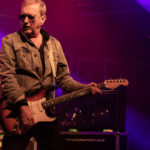“Capital, It Fails Us Now”: Andy Gill of Gang of Four, 1956-2020

 For people of a certain age — Generation X, they used to call us — it’s something of a cliche that if you loved punk rock and had leftist leanings you’d find your way to hearing a Gang of Four album. That album was probably their debut LP Entertainment! — sorry, I meant the “seminal post-punk/experimental album recorded in 1979 that drew inspiration from punk, dub [reggae], and Marxist ideology.” (It’s important to provide all the essential details.) I was one such person blown away by said album, in part because I’d never heard anyone play guitar like Andy Gill, who died on February 1 at the appallingly young age of 64.
For people of a certain age — Generation X, they used to call us — it’s something of a cliche that if you loved punk rock and had leftist leanings you’d find your way to hearing a Gang of Four album. That album was probably their debut LP Entertainment! — sorry, I meant the “seminal post-punk/experimental album recorded in 1979 that drew inspiration from punk, dub [reggae], and Marxist ideology.” (It’s important to provide all the essential details.) I was one such person blown away by said album, in part because I’d never heard anyone play guitar like Andy Gill, who died on February 1 at the appallingly young age of 64.
“Post-punk” refers to rock bands that emerged soon after or simultaneously with bands that came to define the phrase “punk rock” — the Ramones, the Damned, the Sex Pistols, the early Clash, etc. — but that sounded much less like their ’60s predecessors such as the MC5 and the Stooges. They were even more “other” in comparison with mainstream ’70s rock, especially the bands most popular in the U.S. (Compare the Eagles with Joy Division and one might think the two bands came from different planets, not just countries.)
It’s rarely said, but the post-punks were making new versions of art rock, especially in the UK, where art-rockers like David Bowie and Roxy Music were far more popular than they ever were in the U.S. But what Gill and Gang of Four did that was genuinely new was to create what reviewers often called “punk funk”: mixing punk’s brevity, confrontational stance and rejection of ostentatious displays of virtuosity with a version of, yes, funk. Not quite the funk of James Brown or Parliament-Funkadelic, of course. But Gill, at least, wasn’t interested in “copying various icons of black music. (It was) more through simply deconstructing the nature of drumming and where you place the beats. It was like starting from ground zero with the drumming.” Hence, songs like “At Home He’s a Tourist” and “Natural’s Not In It” and “In The Ditch,” where the vocals and sometimes the guitar suddenly drop, and “the drums and bass are right in your face.”
And then, again, there’s Gill’s guitar style. Reviewers labeled it “angular,” “spiky,” referred to “shards of guitar noise” and such. All of which is correct. Long before Nirvana’s Kurt Cobain (who was a fan), Gill created the “anti-solo,” a “Morse code” consisting of “shrieking chords or runs of aggravation along his high strings, all outbursts kept as brief as possible.” (So sayeth Chris O’Leary of Billboard, accurately.) Especially when compared with so many boring, interminable ’70s and ’80s rock and metal guitar solos, Gill’s aesthetic choices still sound bracing.
So what does any of this have to with socialism and why eulogize Gill in the blog of a socialist publication? The name of Gill’s band partly gives it away: it refers to the Maoist faction of the Chinese Communist Party which ruled China in the final years of the Great Proletarian [sic] Cultural Revolution. Of course, this was meant as a joke. But let’s be clear: Gang of Four was a Marxist rock & roll band.
Yes, by the early 21st century Gill was effectively saying that he and original Go4 singer Jon King weren’t really Marxists: “[Our] lyrical approach was very often kind of observation in a way and not dragging the listener to a particular conclusion. Or demanding that the listener shares in some condemnation of something. It’s much more of an observational position, pointing out a few interesting things.”
OK, Andy. Mostly true. But you also wrote “Capital, it fails us now/Comrades, let us seize the time.” And pretty much every Go4 song is clearly Marxist in some way — is romantic coupling “a contract in our mutual interest?” Isn’t it true that history is “Not made by great men“? In “Why Theory?” Gill and King point out that “We’ve all got opinions/Where do they come from?/Each day seems like a natural fact/And what we think/Changes how we act.” Antonio Gramsci would approve. And Go4’s influence on ’80s and ’90s underground and “alternative” bands like the Proletariat, the Minutemen, Fugazi, and Rage Against the Machine went beyond just the sonics — commies all, these guys, even if they refused to make it plain. (Well, the Proletariat and RATM made it plain, repeatedly.)
Gang of Four was a great, distinctive rock band that played Marxist songs and Andy Gill was a brilliant, innovative guitarist. As we’re now entering a second decade where no strand of rock counts as popular music anymore, the world could stand to see more musicians draw from them — aesthetically and politically. The major music labels aren’t going to sign them anyway. What’ve they got to lose?
Rest in power, Comrade Gill.